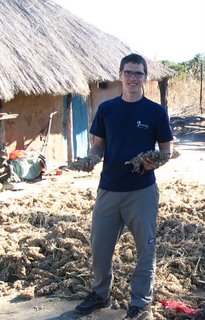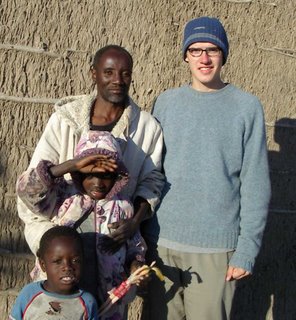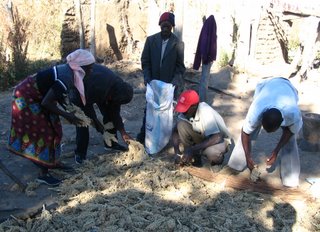*Quick update-> SorghumFEST *was a great success, we had about 300 farmers and 150 from various Zambian NGO's and GO's, some great dancing, bird scaring, and speeches. the next 3 weeks I'll be spending interviewing 30 farmers for my research, then I'm moving to Lusaka to work in the CARE Country office to write up a report and work on some recommendations and presentations. There is also some exciting fun stuff coming up as well this weekend I'll be going to Botswana for a few days, and I'm really looking forward to a rafting trip in the Zambezi towards the end of August, then I'll be on my way home August 26th.
*Q. What is a typical day from waking to sleeping?*
A. Dear concerned fan I generally wake up from my super comfortable bed that was provided by CARE around 07hrs, I always manage to wake without an alarm as there are always people up and about from very early hours (sweeping, bathing and preparing food). The first stage to waking up is removing the mosquito net, then depending if I have any food (biscuits and peanut butter) I might eat some breakfast, otherwise I pack my stuff and begin the stroll to work. I have a 30 min walk, Dambwa North is like a beach without the water, there is some seriously deep sand that makes walking difficult and biking impossible. Depending how hungry I am I might pick up a bun or two and maybe a juice from one of the small shops on the way. There are a few people selling gas and food who I usually spot to have a quick chat with. When I arrive at the office I spend about a bit of time on the internet checking e-mails etc. and greeting everyone who comes into the office. In Zambia you say hello and shake hands with everyone you know when you first see them in the morning, there are about 70 people in the office, so this can sometimes be a bit distracting. Depending on the day I'll either go to the field, or spend the day in the office working on the tools we're using to collect data from the farmers, or on analyzing the data. If I stay in the office I might go into town for nshima for lunch, then if I'm not too busy, we knock off from work at 17:15. When I get home I'll usually chill with the family, maybe read some books, or watch t.v. Dinner or Nshima and rape with some periodic meat is served at 20 hrs and most of the family spends the 2 hours before and after dinner watching t.v.. Generally chilling with the family means watching t.v. with them which consists of really bad south african soaps, with really loud and repetitive commercials (usually for washing soap or cell phones) that everyone sings along with. Generally the family goes to sleep around 21 or 22 hrs, and I enjoy some of the quite sometimes with a glass of tea. If I'm feeling up to it, or really stinking I'll take a bath. This happens usually every two or three days, I think most people here bath much more often, but I'm pretty lazy... Bathing means heating a big pot of water on the stove, then pouring it in a bucket, adding some cold and splashing it on yourself. If I'm going to the field I will spend from 9-10 trying to find transport, CARE has lots of vehicles, but the vehicle+driver+fuel combination can be difficult to achieve to a newby like me. Once we get a vehicle we'll head into town to grab a bit of food for lunch, then drive for 1-2 hours to get to our destination in the field. We generally stop at one of the co-operatives and pick up the sorghum supervisor who directs us to the farmer, and can also act as a translator. We generally finish up around 17hrs, and either head home, or find a farmer to spend the night with in the field. If we decide to sleep in the field, as a guest my role usually consists of sitting in a plastic lawn chair watching the wife prepare the meal. We'll usually go for a stroll to see some neighbors and their fields and animals. Dinner is similar to what we eat in the city, usually better since my family in Livingstone is quite poor and the farmers that they put me with are usually the better off farmers. I usually get a private or semi-private hut to sleep in. The huts usually have a well made and warm bed with blankets, and a small table and candle. I wake up to the sound of roosters, I can join in milking the cows if I want, then I'll have breakfast of bulgar wheat or pumpkin before heading off, back to the co-operative.
*Q. What does your [Zambian] family do.*
A. The quick answer is not a whole lot, but they're always busy. Mommy works in the market selling rape, tomatoes, onions and ground peanuts, she buys the produce from the biggest compound on the other side of town which she walks for two hours to get to. I don't think she makes much money there, she keeps complaining that people are selling vegetables door to door now, so no one comes to the market. Yohani [Zambian brother, 25] he drives a taxi from 23hrs, to 03hrs. He picks up some people when they knock off from work, it's all prearranged, I'm not sure if he also picks up people on the fly, he makes about $100 per month. He doesn't have a full license for driving a taxi yet, so this is done illegally, he also does not own the vehicle, he drives it for someone else who probably drives it all day. He is working towards getting a full license and aspires to go to school to be an auto mechanic, but can't afford tuition, which would be about $900 for the two year course. I don't think he does much during the day, but whenever I ask he answers that he's done plenty. He usually walks to town and maybe meets a few friends. He's quite involved with his church. Yohani live is a small dark brick building behind the house, apparently is used to be a chicken house, but I think they cleaned it well before he moved in. Yohani is really awesome, right now he's reading the no-nonsense guide to world poverty, its pretty cool hearing some of his analysis. Linda [Zambian sister, 20] just have a beautiful baby girl, so she spends her time at home. Her and her boyfriend share the room next to me. She does pretty much nothing, mostly telling the younger girls what to do as far as cooking and cleaning. Ndaka, Tesila, Diana, Queeny [Zambian Niece's, 15, 16, 13, 12] Sometimes the girls go to school, sometimes they dont. They do all the chores around the house, cooking, washing, sweeping etc. usually in rotation. They are all really cool, good dancers as well. Tesila really enjoys singing and does a great job in her church choir, she also spends a lot of time on her homework. Ndaka just left to live with her uncle, and now here mom is livig here, not too sure how this switch came about but whatever. Diana is really shy, but super smiley and fun, she spent a long time preparing a letter for the penpal that I found her in Canada. Queeny doesn't speak english to well, but always acts like she understands me, she freaks me out a bit with how she dresses, often pretty revealing. Willy, Warren [Zambian nephew's, 12, 3] Willy usually goes to school, and I've seen him working a few times collecting sand for blocks. He also dug a hole beside the house for tossing garbage in, the hole is really impressive, its about 12 feet deep, I have no idea how he did it. Warren spends his time at home playing on the street with the neighbourhood kids, or sneaking into my room and breaking stuff. Generally whenever I come home he comes to me and starts counting, since this is what I've been trying to teach him. But he always starts at 2 and skips 7...
*Q. What is the situation with water waste and electricity.*
A. Livingstone is a decently big city so it has a good water and electricity system. The water we get is all treated and chlorinated, but I usually drink water from the office which is boiled, or add extra chlorine. The Zambezi river is close, so all the water comes from there. Same deal with the electricity, they have a generating station at the falls. My family really sucks at conserving water and power, the tap is always left trickling, and the lights are left on all night. I suppose it balances out though since we only have one sink, and 6 lights. The power is fairly reliable, there have been about 6 power outages which usually only last a few hours. The water is a little less reliable, maybe 70%, not sure why, I think they get a lot of leaks and shut it down for repairs. The waste collection system does not exist. All garbage is just burnt in people's yards. Most glass or plastic bottles are reused, people don't really create a lot of garbage, a bit of plastic and some food waste.
*Q. What is Zambian culture like.*
A. There is not much Zambian culture left, if I had to name it something I would say chill culture. People have been Britishized and South Afrcanized. But there are still some cool things. I love going to the united church here it is really energetic; the services lasts 3 hours and 2.25 hours are awesome super loud singing, with some dancing and spinning in circles mixed in. Most women where chitenge's which are skirt wraps, and men just weat slack and shirts (all our old cloths) 50 cent, Brazil, and bob marley are the most popular shirts. Almost everyone wears black dress shoes. In the villages there is still some culture left; the dancing usually consists of 3 drummers, they a bunch of people stepping, leg kicking out thing, then a few people really working their hips and behinds.
*Q. What are some of the difficulties your facing.*
A. One of the big ones is being seen as a hug money source by the family I'm staying with. I'm paying about 3x market rate for my room, and I think the rent I'm paying is about equivalent to the total combined family income. So naturally I'm greatly appreciated as a source of income. The day after I paid rent the first time we had a nice electric 2 burner stove the next day. After I paid my second installment we got a colour t.v. And the day after we got the colour t.v. mommy was telling me how much she wants a satellite dish, and a cell phone, and how it would be great if I could just buy her those things. There have also been other little things like taking my light bulbs and finishing my peanut butter etc. In the grand scheme its really not a big deal, I don't mind helping out the family, but it would be cool if some cash were spent on increasing the quality of our food, instead of t.v's. Stuff at work is mostly good, sometimes it's really frusterating when you say something and the other person says yes even though they don't understand what you said. Today a car was leaving into town and I asked if Jo (new long term ewb) and I could grab a ride, they said yes, then the car left ten seconds later without us :^( Also sometimes things are way too chill, and people don't take initiative or responsibility, when problems arise, things just stop and noone tells you or tries to solve them. As an example, we tried to order some sorghum processing equipment from Botswana and when the order made to to purchasing at CARE, the supplier told purchasing that they need the cash in advance, but purchasing doesn't pay until they recieve the product, so after purchasing heard this news from the supplier things just stopped and they didn't bother letting anyone know or trying to find a solution. I have about ten other examples of exactly the same thing, you really need to follow up vigilantly to ensure things happen here. And there are always plenty of excuses for any delays, the most common is funerals, most people attend at least one per month. *Q. Why do you take your own room while 5 sleep in the other, and 2 sleep in the shed in the back?* A. Generally rent for a room in Dambwa North should cost 80,000-200,000, I'm paying 500,000 I don't think they could ask for nearly as much if I didn't have my own room. I offered to share but they weren't into it. I'm sure for what I'm paying I could probably demand the whole house. Either way people here don't have the same needs of privacy as people in the west, I really don't think they mind sleeping 5 in a room, or 2 in a shed.

Making a brick using the compressed brick making machine from the university of Zambia.


Mr. Lemba's Family

Me and Mr. Lemba posing in front of his Maize.




